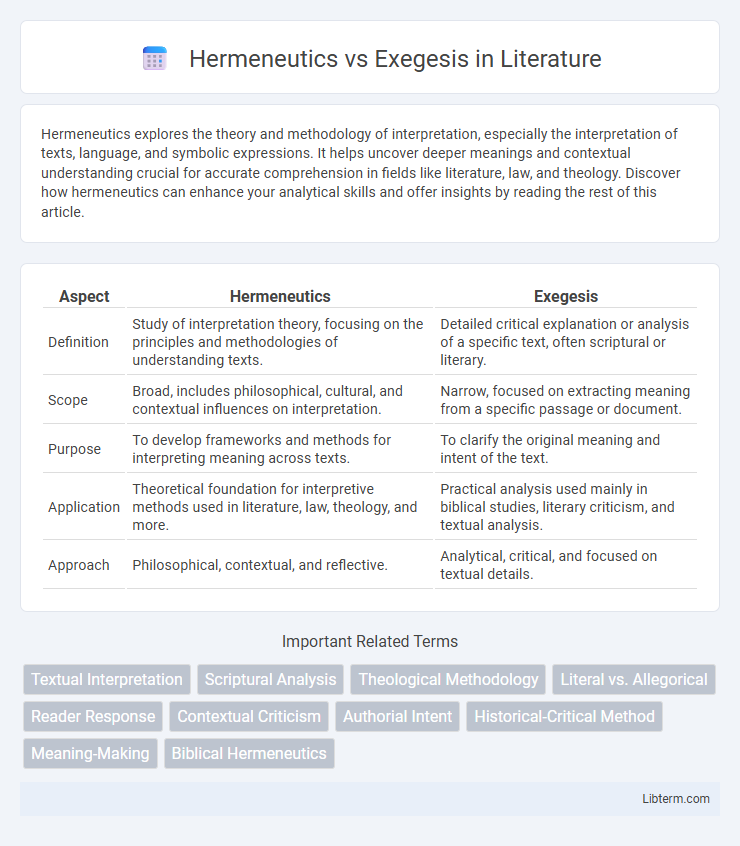Hermeneutics explores the theory and methodology of interpretation, especially the interpretation of texts, language, and symbolic expressions. It helps uncover deeper meanings and contextual understanding crucial for accurate comprehension in fields like literature, law, and theology. Discover how hermeneutics can enhance your analytical skills and offer insights by reading the rest of this article.
Table of Comparison
| Aspect | Hermeneutics | Exegesis |
|---|---|---|
| Definition | Study of interpretation theory, focusing on the principles and methodologies of understanding texts. | Detailed critical explanation or analysis of a specific text, often scriptural or literary. |
| Scope | Broad, includes philosophical, cultural, and contextual influences on interpretation. | Narrow, focused on extracting meaning from a specific passage or document. |
| Purpose | To develop frameworks and methods for interpreting meaning across texts. | To clarify the original meaning and intent of the text. |
| Application | Theoretical foundation for interpretive methods used in literature, law, theology, and more. | Practical analysis used mainly in biblical studies, literary criticism, and textual analysis. |
| Approach | Philosophical, contextual, and reflective. | Analytical, critical, and focused on textual details. |
Introduction to Hermeneutics and Exegesis
Hermeneutics is the theoretical study of interpretation principles, focusing on how meaning is derived from texts, especially sacred scriptures, within historical and cultural contexts. Exegesis involves the practical application of these principles, analyzing specific passages to uncover the original intended message. Understanding the distinction clarifies that hermeneutics provides the foundational framework, while exegesis implements that framework for detailed textual analysis.
Defining Hermeneutics
Hermeneutics is the theory and methodology of interpretation, especially the interpretation of biblical texts, literature, and philosophical writings. It involves understanding the historical context, language, and intent behind a text to extract meaning beyond its literal words. Unlike exegesis, which is the critical explanation or interpretation of a specific text, hermeneutics provides the broader framework and principles guiding how texts are interpreted.
Defining Exegesis
Exegesis is the critical interpretation and explanation of a text, especially religious scriptures, aiming to uncover the original meaning intended by the author. It involves rigorous analysis of linguistic, historical, and cultural contexts to provide an accurate understanding of the text. Hermeneutics, in contrast, is the broader theoretical framework that studies the principles and methods of interpretation itself.
Historical Development of Hermeneutics
Hermeneutics has evolved from its origins in ancient philosophy and biblical interpretation to a broader discipline encompassing the theory and methodology of understanding texts, while exegesis remains focused on the critical interpretation of specific scriptural passages. Key historical figures such as Friedrich Schleiermacher and Wilhelm Dilthey expanded hermeneutics beyond theological contexts to the human sciences, emphasizing the importance of historical context and authorial intent. This development marked a shift from exegetical techniques aimed at uncovering literal meanings to a more dynamic process of interpreting textual meaning within cultural and historical frameworks.
Historical Development of Exegesis
Exegesis has evolved historically from early biblical interpretations in the Hellenistic period to sophisticated methods during the Middle Ages and Enlightenment, emphasizing context, language, and authorial intent. Hermeneutics, as a broader philosophical framework, emerged later to address the theory and methodology of interpretation itself, influencing modern exegetical techniques. The historical development of exegesis reflects a progression from purely theological readings to critical, interdisciplinary analysis rooted in historical and linguistic scholarship.
Key Differences Between Hermeneutics and Exegesis
Hermeneutics involves the broader theory and methodology of interpretation, especially of texts, focusing on understanding underlying meanings and contexts, while exegesis is the critical explanation or interpretation of specific texts, particularly religious scriptures. Hermeneutics addresses the principles and frameworks guiding interpretation, whereas exegesis applies these principles to analyze and clarify particular textual passages. Key differences lie in scope and application: hermeneutics is philosophical and generalized, exegesis is practical and text-specific.
Relationship Between Hermeneutics and Exegesis
Hermeneutics serves as the theoretical framework and methodology guiding the interpretation of texts, while exegesis is the practical application of these principles to analyze and explain specific passages. The relationship between hermeneutics and exegesis is integral, as exegesis relies on hermeneutic strategies to uncover deeper meanings, contextual nuances, and authorial intent in scriptural and literary works. Effective exegesis depends on a solid hermeneutical foundation, ensuring coherent, contextually relevant, and historically informed interpretation.
Practical Approaches in Biblical Interpretation
Hermeneutics involves the theory and methodology of interpreting biblical texts, emphasizing understanding historical context, language, and literary genres to uncover intended meanings. Exegesis applies these hermeneutical principles practically by systematically analyzing scripture passages through linguistic, grammatical, and theological lenses to extract accurate interpretations. Effective biblical interpretation combines hermeneutical frameworks with exegetical tools such as word studies, textual criticism, and contextual analysis to ensure faithful application in teaching and preaching.
Modern Challenges in Interpretation
Modern challenges in interpretation highlight the dynamic tension between hermeneutics and exegesis, where hermeneutics emphasizes the philosophical principles of understanding texts within contemporary contexts, while exegesis focuses on meticulous analysis of original languages and historical settings. Advances in digital humanities and increasing cultural pluralism complicate the exegetical task by demanding nuanced engagement with diverse interpretive frameworks and critical methodologies. These challenges necessitate a balanced approach that integrates hermeneutic openness with exegetical rigor to achieve accurate and relevant interpretations in today's complex textual landscape.
Conclusion: Choosing the Right Method
Hermeneutics offers a broad framework for interpreting texts by considering context, culture, and subjective understanding, while exegesis emphasizes a detailed, systematic analysis of scriptural or literary content. Choosing the right method depends on the purpose: hermeneutics suits exploring underlying meanings and contemporary relevance, whereas exegesis is ideal for rigorous textual clarification and doctrinal accuracy. Scholars and readers benefit most by integrating both approaches, leveraging hermeneutics for interpretive depth and exegesis for textual precision.
Hermeneutics Infographic

 libterm.com
libterm.com